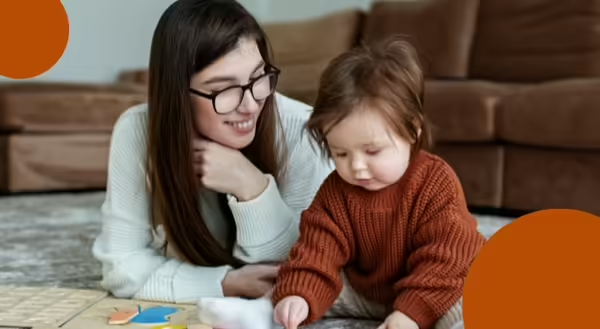
Play is a very important part of life, from infancy throughout childhood. We often think of the importance of play early in childhood, but there is value throughout childhood, even through adolescence. My children are 11 and 13 now and the way we play together has changed over time, but there are still many benefits to encouraging play at their age, including practicing self-regulation, learning to adapt and compromise, as well as just having a way to release from the stress and busyness of their days.
Research from Harvard University and the Center on the Developing Child has shown that play in early childhood helps build strong brain architecture and helps children at any age strengthen executive functions such as memory, self-control, and the ability to focus. The Center created this handout-series with suggestions for play from infancy through the teenage years. In the early years, the activities are designed to be done with parents or other adults, but as the children grow into adolescents, the activities are more independent or with peers.
The National Association of the Education of the Young Child also stresses the important of play with children and the benefits that come from it. They share some great examples of ways you can play and the skills that can be improved in their article, “Ten Things Every Parent Should Know About Play”:
- Playing grocery store can increase cognitive skills like math and problem solving.
- Building with blocks and doing obstacle courses outside can increase physical abilities.
- Naming animals while you play zoo can increase vocabulary skills.
- Playing together in pretend school or park can increase social skills.
- Creating a menu for your pretend restaurant can increase literary skills.
MEET THE AUTHOR
Judy Schmidt provides leadership to 4-H metro programming in Peoria County. Schmidt joined Extension in 2001, working as a Youth Development Educator at the East Peoria Center and joined the Fulton-Mason-Peoria-Tazewell Unit in 2011. Her work focuses on 4-H youth development programming in the local metropolitan area, specifically leading positive youth development initiatives for after-school programs, community groups, 4-H clubs and other youth-serving organizations. Her areas of expertise include positive youth development principles, youth leadership, and work with teens as teachers.
Schmidt attended the University of Illinois at Urbana-Champaign for her bachelor's degree in psychology and also for her master's degrees in Social Work and Marriage and Family Therapy. She is a certified facilitator of the Matrixx System/Real Colors program by the National Curriculum and Training Institute.
ABOUT THE BLOG
Connection Corner: is a blog that provides timely information, activities, and resources to help you stay connected to loved ones, the world around you, and yourself.